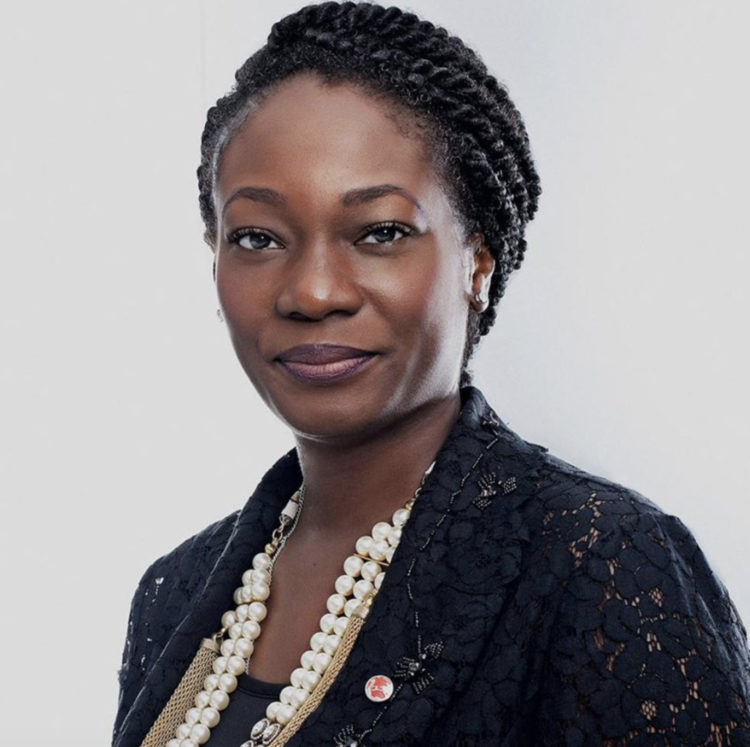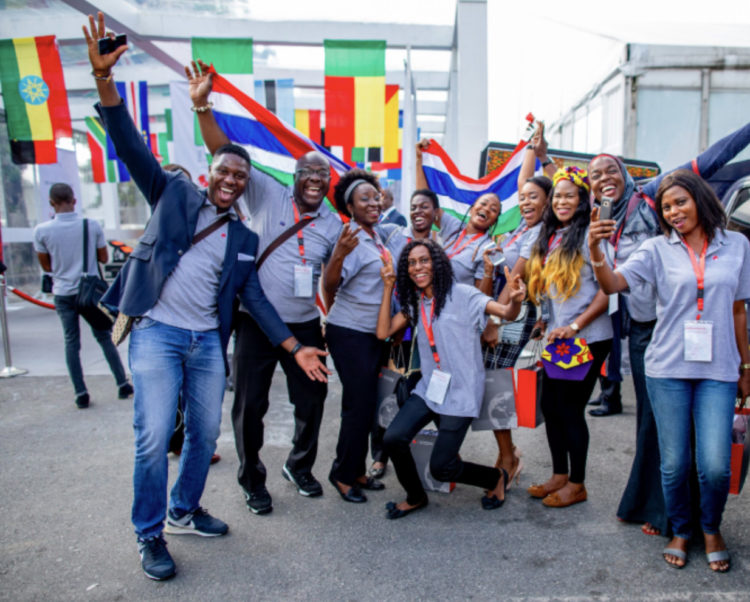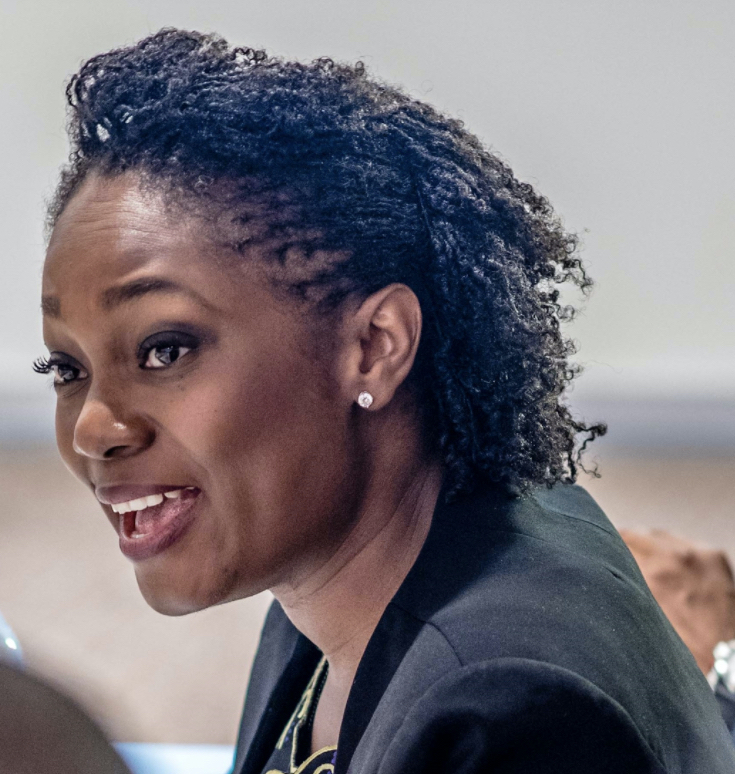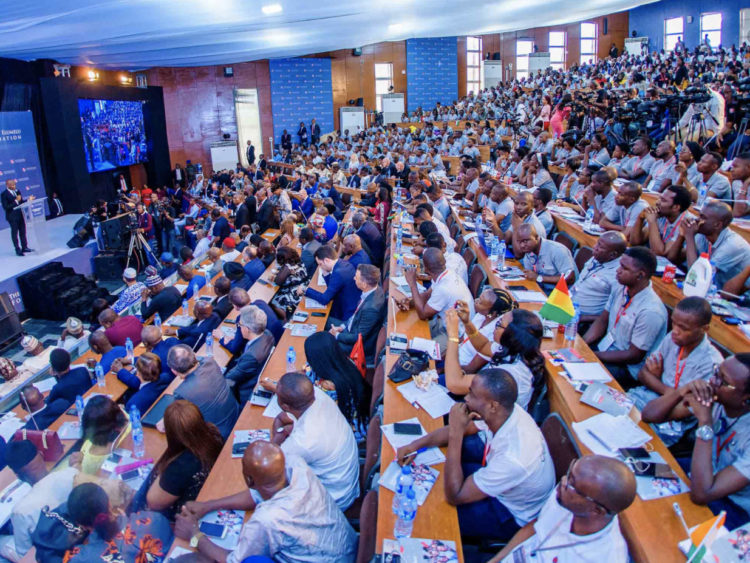On March 2nd, 2020, I had the privilege to participate in the second annual Attorney General Alliance Africa Conference in Accra. When Karl A. Racine, Attorney General of the District of Columbia, was called to the podium to speak, he chose to dance to the song Buffalo Soldier by the late Bob Marley as he made his way to the stage. And in his speech, he shared a captivating historical and emotional narrative for that choice of song. “Now’s the time for Africa to take its rightful place,” he remarked. His presentation was of significant importance to me.
Today, as we look at the next phases of Africa’s transatlantic cooperation, there’s a growing consensus on the need to rethink all forms of development agendas to better align with the needs of the people. And in that regard, I had the opportunity to interview Ifeyinwa Ugochukwu, the CEO of The Tony Elumelu Foundation, for the sixth installment of my thought leadership interview series.
Ifeyinwa Ugochukwu is a lawyer and a passionate advocate of the transformative power of entrepreneurship as the key to the economic development of Africa.

Ugochukwu joined the Tony Elumelu Foundation in 2017 as the Director of Partnerships and Evaluations, a role she held for two years. In this position, she developed the Foundation’s institutional framework for financial and value-add partnerships to scale the impact of the $100 million TEF Entrepreneurship programme beyond its initial target to empower 10,000 entrepreneurs. The resulting strategic partnerships with governments, development finance institutions, multilaterals and private organisations led to a record-breaking selection of 3,050 entrepreneurs in 2019.
She was later appointed in April 2019 as the third Chief Executive Officer of The Tony Elumelu Foundation, Africa’s leading philanthropy.
Over the past few years, there’s been growing criticisms from both the academic and development sectors that top-down, Western-led development assistance is a failing model because they have failed to deliver promised socio-economic benefits to recipient countries. What best practices can the Tony Elumelu Foundation share with the development community on creating equitable partnerships that stem from local African priorities?
Everyone knows that the lifeblood of all developing economies is the Small and Medium Enterprises (SMEs). These entities generate 70 to 90% of the jobs available. So it’s right to say that top-down development strategy has not been effective. Over the last 50 years, the development community has spent billions of dollars in aid-related intervention in Africa, but that hasn’t produced many benefits.

Hence, Mr. Elumelu coined a phrase called Africapitalism, a concept that says Africa’s economic development rests with the private sector. And only through strategic private sector-led investments, in collaboration with the public sector and development organizations, will Africa experience the economic prosperity and social wealth we can, and should, be experiencing now, given the investments. So, at the Tony Elumelu Foundation, we believe in the bottom-up approach. We are institutionalizing luck and democratizing opportunities, giving those at the bottom of the pyramid a hand-up, not a handout. And that’s what Africa needs.
In 2015, our founder launched a $100 million commitment to train and invest in 10,000 African entrepreneurs over ten years. We develop our proprietary training program, which many people have likened to a mini-MBA. And we believe that training, capacity building, and funding are two sides of the same coin. If you train someone and tell them, “Well, hope you have luck in raising money,” then it’s just theory. It’s no different from what we’re doing in classrooms. But when you train and give funding, they can prove their concept; they’re able to get their foot in the door. They’re able to start their entrepreneurial journey. And that is what Africans need; a robust SME sector.
We need to empower African entrepreneurs because every entrepreneur is a problem solver. All of the issues we see in Africa today are business opportunities for entrepreneurs. Africa is the last virgin territory. And so we believe that it is only by empowering African entrepreneurs will we build a strong SME sector that will lead Africa to economic prosperity, where poverty is a thing of the past. And our young people are engaged and have a job-creating mentality, not a job-seeking mentality.

Talking about our young people, Africa’s population growth has been the epicenter of much debate. From the Foundation’s experience of supporting African entrepreneurs over the last ten years, what are your views on how to actualize transformational change among African youth and reap the full benefits of this human capital?
Population reduction has never been the solution to any problem. And I don’t think population reduction is on any African government’s plan, as it is very opposite to the African family unit principle. But we know that Africa’s burgeoning youth population could either be the world’s greatest catastrophe or the world’s most significant opportunity because, by the year 2050, 70% of all the young people on the planet will be of African descent.
Africa is the only continent getting younger. And it is not just African governments, but also foreign governments that should invest in the African youth to ensure that come 2050, the African youth are assets to the world with massive spending power and a thriving, robust workforce. That is why we have prioritized job creation. And the only way to prioritize job creation is through entrepreneurship empowerment.
We also need to ensure we educate the youth properly, not for their parents’ world, but for tomorrow’s world, the world they will face. That world is entirely driven, not just by technology but also by emotional intelligence. We must make sure we give African youths the practical skills they need to prepare for the future of work and prepare for remote learning and remote working. That means every African should be connected to one of the direct investments now. Until we do that, we have not started.
We know that Africa missed the first three industrial revolutions, and we can not afford to fumble in the fourth industrial revolution, which is a digital revolution. The Covid-19 pandemic has accelerated the need for connectivity and technology adoption. So African governments must act quickly to make sure there is no one left behind.
At the Tony Elumelu Foundation, we are wholly committed to this idea. Part of our training is to make sure our entrepreneurs understand the importance of technology, that no matter what you’re doing, you must be leveraging technology in one way or another. And in that regard, we’re preparing our youth for the world of tomorrow. We’re giving them the skills and mindset they need to make a success of their businesses and provide employment, and even training, to others.
And using you as a case study, as a beneficiary of the Tony Elumelu Foundation, your company Stars From All Nations has already begun to pay it forward. That is what we want to see. As of 2019, we have trained, mentored, and funded a little over 9,000 entrepreneurs like yourself. And we know the impact these 9,000 have made. Imagine what the result would be if we were to train and fund 1 million or 10 million entrepreneurs. So the solution to harnessing the full potential of Africa’s youth population lies in education and entrepreneurship empowerment.
Governmental policy and regulatory frameworks are crucial elements of the entrepreneurship ecosystem. And one critical aspect of your job is fostering collaboration between businesses, investors, governments, academia, civil society, philanthropists, and development institutions to create conditions that will empower the African private sector to thrive. Tell us about your achievements in this direction.
We don’t see it as achievements; we see it as progress in collaboration. I always say there’s no such thing as competition in this sector, but only collaboration. The private sector has its role, but the public sector also has its role because the private sector cannot operate in a vacuum. So the public sector must work to create an enabling environment for African entrepreneurs in every African country. But the public sector itself cannot do this without the partnership of the private sector, because the private sector knows where the shoe pinches and what it needs to foster an enabling environment. That is why our work at the Foundation is critical.
Year-on-year, we bring together the public sector and private sector advocacy. That is vital to our work. For example, one of our entrepreneurs in Kaduna State, Nigeria, reached out to us with a report that the multiple tax system in Kaduna State was crippling startups. We followed through on the information and coordinated a face-to-face meeting between the entrepreneurs and the state governor. And it might interest you to know that the governor did not realize there were such layers in the state’s tax system.
Within a few short months, he developed policy instruments that streamlined and consolidated the Kaduna state laws. Today, those entrepreneurs are thriving and grateful. That is one example of how the Tony Elumelu Foundation brings together the public and private sector players and development organizations to create conditions that can help entrepreneurs thrive.
That is also why we established the Tony Elumelu Foundation entrepreneurship forum, which we hold every year. Again, we bring together heads of state. Last year, we had six Presidents from across the continent in participation. Entrepreneurs can sit in the same room with these heads of states and speak to them directly. The forum is a unique platform that fosters interactions and robust discourse on lasting policy change towards creating an enabling environment for young African entrepreneurs.
The coronavirus pandemic has shown that African universities are an underutilized resource. Talk about how African governments can leverage the critical mass of professionals who work in universities across the continent to enhance development and research contributions in responding to national issues better.
You know, it’s a difficult one because this cannot happen without fiscal responsibility. If we are not investing in African universities, then we short-circuit the capacity of our bright and brilliant minds to do what they know best. That is why you find scattered around the world, the best surgeons, professors, scientists, and researchers from Africa. They do not have the encouragement and enabling environment they need in their continent.
So the one thing the government can do is to prioritize investments in our tertiary education and research. And yes, with the Covid-19 pandemic, why is Africa sitting on the fence waiting for other countries to offer us a vaccine? We can develop our solutions; we can create our vaccines, and we see that even with our entrepreneurs.
One TEF entrepreneur in Ghana, Laud Basing, developed a Covid-19 test kit with the support of the Kwame Nkrumah University of Science and Technology and the Ghana Ministry of Health. That is a classic example of what is possible in Africa if governments make the right investments.
As part of the Foundation’s work, we’ve partnered with development organizations such as the UNDP to support a critical number of brilliant initiatives. I can also cite the Tony and Awele Prize as an example. The prize recognized young African students who are top of their class to inspire them in academic excellence and discipline. As Mr. Elumelu often says, no one will develop Africa but us.
In your opinion, what is the future of global trade, and where do you see Africa in that equation?
As we found with the implementation of the Africa Continental Free Trade Agreement (AfCFTA), Africa is the world’s largest free trade area. We’ve taken a step in the right direction, but implementation is critical. And we need to make sure our governments are walking the walk and not just talking the talk. The global economic shocks caused by Covid-19 will not leave Africa unscathed.
The economic and trade costs are evident in the oil and tourism industries. And that’s because many of our countries are mono economies, some countries wholly dependent on oil and others on tourism. So you find that our currencies were almost on the verge of collapsing during the lockdown.
We must open the doors, remove the fragmented markets in Africa, and remove the boundaries so Africans can trade. For many countries, Africa is one of the largest net importers. And if we begin to engage with each other and manufacture our goods, then we can be confident that in terms of global trade, Africa comes out shoulder to shoulder, equal partners with the rest of the world. But as long as we continue to remain closed off to each other, as long as it is still more expensive for one to travel from Lagos to Angola or Zambia than it is to travel to New York or Australia, we’ve not started.
I’ll have to get on several different planes sometimes to reach an African country. But I have direct flights to most major cities in the world. Let’s not even talk about shipping and maritime. There was an incident where Ghana needed about a hundred thousand metric tons of coal. And Nigeria is rich in coal, and we are just at the back door. The problem was, how do you get it to Ghana? There was no way to get it to Ghana.
Road trucking was too expensive, and there are no rails, as that would’ve been the obvious choice. And with maritime, the ships come to Africa, dump their produce, and go back empty. They’re not interested in local logistics because it doesn’t pay for them to ferry to an African country. And it’s because our legislature allows that. Eventually, Ghana had to bring in that coal from Australia! Can you imagine that?
So the only way for us to be at the forefront of global trade is that we must begin to trade with each other and put laws in place to facilitate intra-Africa trade, which is horrendously low. And I’m hoping the AfCFTA will actualize that.
Tell us what to expect from the Tony Elumelu Foundation in the next five years.
On the October 29th, 2020, we will mark ten years since the Foundation came into existence and six years of the Tony Elumelu Foundation entrepreneurship program. We’re thrilled to be celebrating this landmark. And for us, the celebration is every one of our beneficiaries. That is our legacy and their success, their stories of impact, the number of jobs they’ve created, the amount of revenue they’ve generated, is our legacy.

The future of the Tony Elumelu Foundation centers on the provision of robust, multifaceted assistance to entrepreneurs around Africa. And as you know, our flagship entrepreneurship program is a significant component of our strategic plan in the coming years. As I mentioned earlier, if we’re seeing such a massive impact with 9,000 entrepreneurs we’ve invested in, imagine what would happen when we have trained and funded 10 million entrepreneurs in another ten years.
I see that the Foundation will be growing exponentially. So to give you an idea, in 2019, we trained and funded over 5,000 entrepreneurs. So in one year, we trained and funded more than we did in the preceding four years. That shows you there is exponential growth going on. And that’s the result of strategic partnerships with development organizations looking to engage with Africans differently, tell a different story, and take on that bottom-up approach. These partners are beginning to see the Tony Elumelu Foundation as a choice partner; as a tried, tested, and credible partner in all things entrepreneurship on the continent.
Of course, our tefconnect.com platform is another area of massive growth. It is the largest digital platform for African entrepreneurs. As of today, we have over a million subscribers. We want to create the Facebook of African entrepreneurship in the next ten years; we want to see a hundred million subscribers on tefconnect.com. It would be the gateway of the African entrepreneurship ecosystem to the world, giving entrepreneurs everything they need from startup information, training tools, incorporation tools, everything you need as an entrepreneur to access the markets.
The future is bright. And as I always tell entrepreneurs, there’s no better time to be an African entrepreneur. We have put the African entrepreneur on the global agenda. Every government, every development organization knows that if you want Africa to make progress, investing in its entrepreneurs, investing in the youth is the way to go. And that is the message we’re taking to the world. That is the example we’re leading with and the future we are creating. Not just for the Foundation, but also Africa.
If you missed the previous installments of this interview series, find them here. To participate in a subsequent discussion, kindly reach out by email at tomchris@sfanonline.org.
